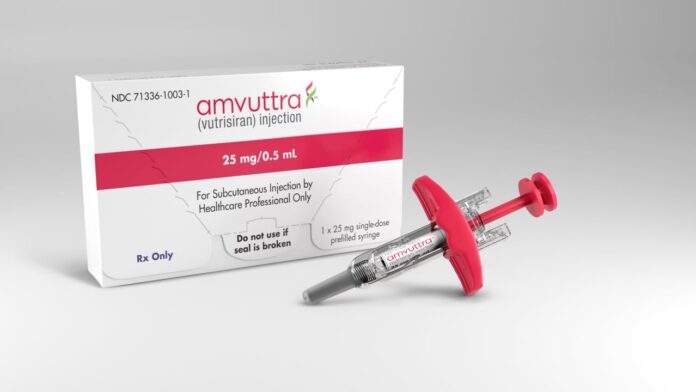Cambridge, Mass– At the Heart Failure 2025 Congress in Belgrade, Serbia, Alnylam Pharmaceuticals unveiled updated results from the HELIOS-B Phase 3 clinical trial, reinforcing the significant impact of AMVUTTRA® (vutrisiran) on patients with transthyretin-mediated amyloidosis with cardiomyopathy (ATTR-CM). The new analysis highlights the drug’s ability to reduce both all-cause mortality and a range of cardiovascular events, including heart failure hospitalizations and urgent heart failure visits.
Presented as a late-breaking abstract and simultaneously published in the Journal of the American College of Cardiology (JACC), the data revealed that vutrisiran achieved a 46% reduction in urgent heart failure visits during the double-blind treatment period, compared to placebo. The drug, which acts by silencing transthyretin (TTR) gene expression, demonstrated rapid and sustained knockdown of the TTR protein, a key driver in ATTR amyloidosis.
Further analysis of data extending up to 42 months reinforced vutrisiran’s impact on survival. The study showed a 36% reduction in the risk of all-cause mortality and a 33% reduction in cardiovascular mortality among patients treated with vutrisiran. Over 99% of the 654 patients in the HELIOS-B trial had their vital status recorded at the 42-month mark, strengthening the reliability of the results.
The HELIOS-B population represented a contemporary group of patients with access to advanced background therapies, including TTR stabilizers and SGLT2 inhibitors. Despite this, vutrisiran delivered notable benefits, including a 33% reduction in heart failure hospitalizations, a 27% reduction in cardiovascular events, and a 25% decrease in cardiovascular hospitalizations over a 36-month period.
“These new data—including the impact on mortality, cardiovascular events, and urgent heart failure visits—add to the story of consistency and magnitude of benefit,” said Dr. Pushkal Garg, Chief Medical Officer at Alnylam. “The HELIOS-B results continue to reinforce AMVUTTRA as a clinically differentiated, first-line option for patients with ATTR-CM.”
In addition to the HELIOS-B data, Alnylam also presented new findings from a subgroup analysis focusing on patients whose disease had progressed while on tafamidis, a commonly used TTR stabilizer. The results further explored vutrisiran’s potential in reducing mortality and recurrent cardiovascular events in this subset of patients.
Alnylam also shared details of its upcoming TRITON-CM Phase 3 trial, which will investigate nucresiran, a next-generation RNAi therapeutic. Nucresiran has demonstrated TTR knockdown of over 95% with biannual dosing in early studies. The TRITON-CM trial is expected to enroll approximately 1,200 patients with confirmed ATTR-CM and is slated to begin in the first half of 2025.
AMVUTTRA has already received approval from the U.S. Food and Drug Administration (FDA) and Brazil’s ANVISA for the treatment of cardiomyopathy in both wild-type and hereditary forms of transthyretin-mediated amyloidosis. The European Medicines Agency’s Committee for Medicinal Products for Human Use (CHMP) recently issued a positive opinion in favor of vutrisiran, with a final decision from the European Commission anticipated in the third quarter of 2025. Regulatory review is also ongoing in Japan, with further global submissions expected this year.


